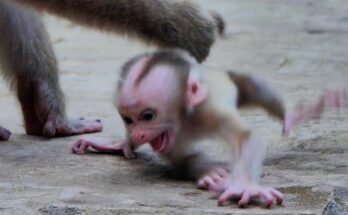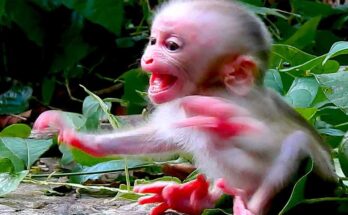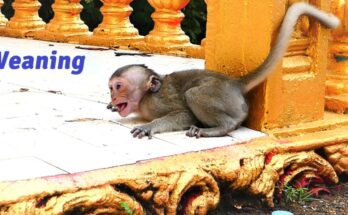In the heart of the wild jungle, life moves with both beauty and cruelty. Among the rustling leaves and echoing birdcalls, a small newborn monkey cried quietly beneath a tree. Her fur was still soft and fragile, her body tiny and weak. She had no name, no warm body to cling to—because her mother, Rozy, had walked away.
Rozy, a mature and once nurturing monkey, had just given birth a few hours earlier. But something was different. Instead of cuddling her newborn, she kept her distance. At first, she watched the baby from a short space away, eyes full of confusion and uncertainty. The troop waited too, expecting Rozy to eventually respond to her motherly instinct. But as time passed, her back turned, and she left her baby alone on the cold forest floor.
The infant monkey, now alone and vulnerable, whimpered softly. Her cries were not loud, but they were full of pain—cries for warmth, for milk, for her mother’s heartbeat. Yet Rozy never came back.
It was a heartbreaking sight for anyone witnessing it. A tiny life, just beginning, already facing rejection in a world where survival depends entirely on a mother’s care. Other mothers in the troop kept their distance. In monkey society, each mother is responsible for her own, and few dare to interfere unless absolutely necessary.
The baby’s frail body trembled. She tried to crawl, lifting her head, searching for warmth, for something familiar. Her instincts told her to cling to a mother who wasn’t there. Again and again, she reached out into the air, only to fall back against the earth.
No one knows why Rozy made that choice. Perhaps she was overwhelmed. Maybe she felt something was wrong with the baby. In the wild, even mothers can make painful decisions—ones that seem unthinkable to the human heart. But to the animals of the forest, survival sometimes comes with sacrifice, even cold rejection.
Despite her abandonment, the baby didn’t give up. Her cries, though weak, continued. Her tiny hands clenched the dirt, and her eyes blinked in search of comfort. Every movement said the same thing: “I want to live.”
Some older females in the group began to watch more closely. Occasionally, another mother would inch a little closer, sniff the baby, then return to her own. It wasn’t help—not yet—but perhaps a sign of future hope. In rare cases, abandoned babies can be adopted by others in the troop.
But at that moment, nothing could soften the scene. A newborn, left alone, too innocent to understand why the one she needed most had turned her back.
The jungle was alive all around her, but for that tiny baby, it was a lonely world. A world that had already shown her the pain of rejection. And for those watching, it was almost impossible to hold back tears—because few things are more painful than witnessing a mother walk away from her baby.
Yet in that sorrow, there is also the quiet strength of survival. The baby was still breathing. Still crying. Still hoping.


